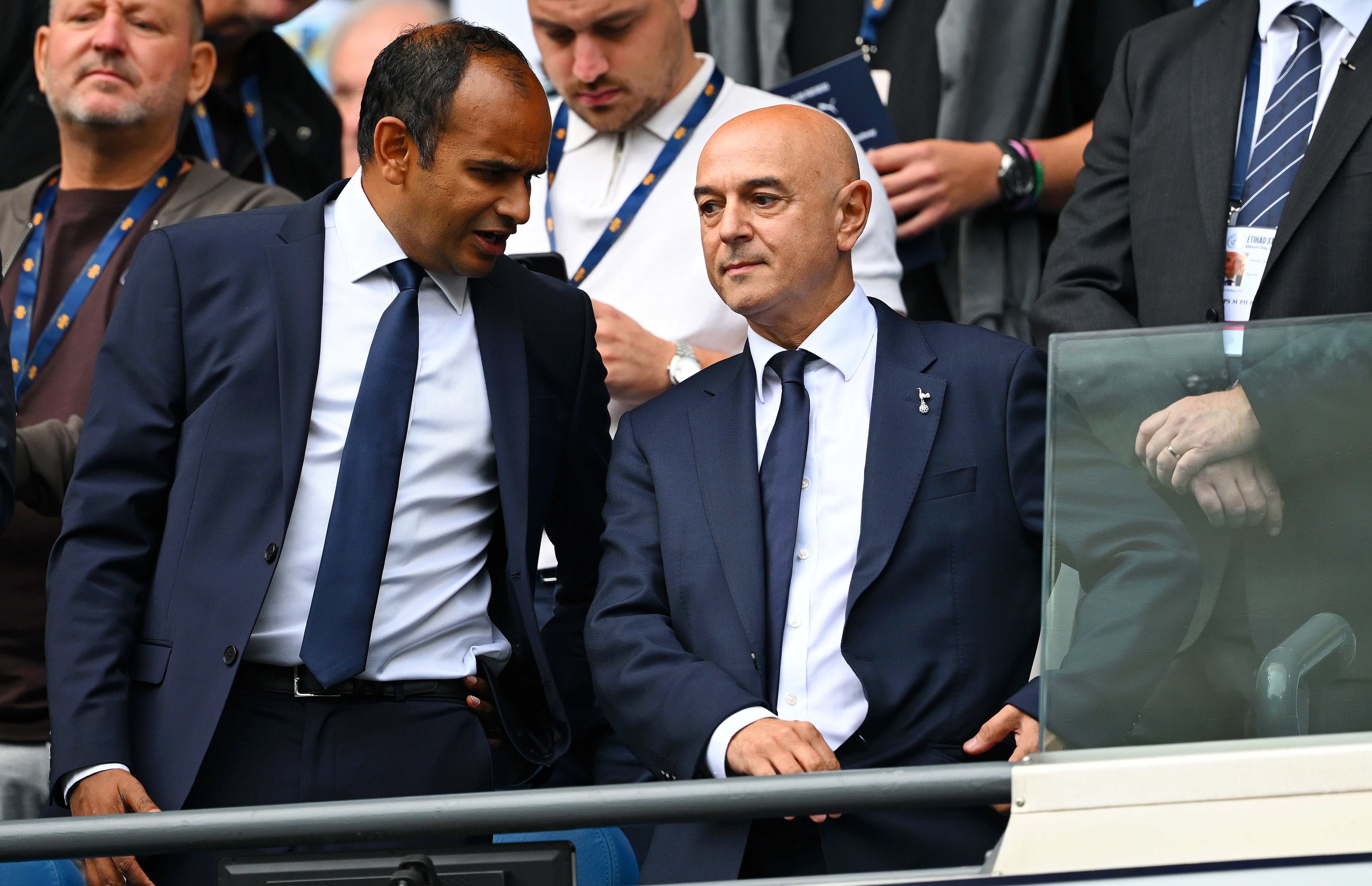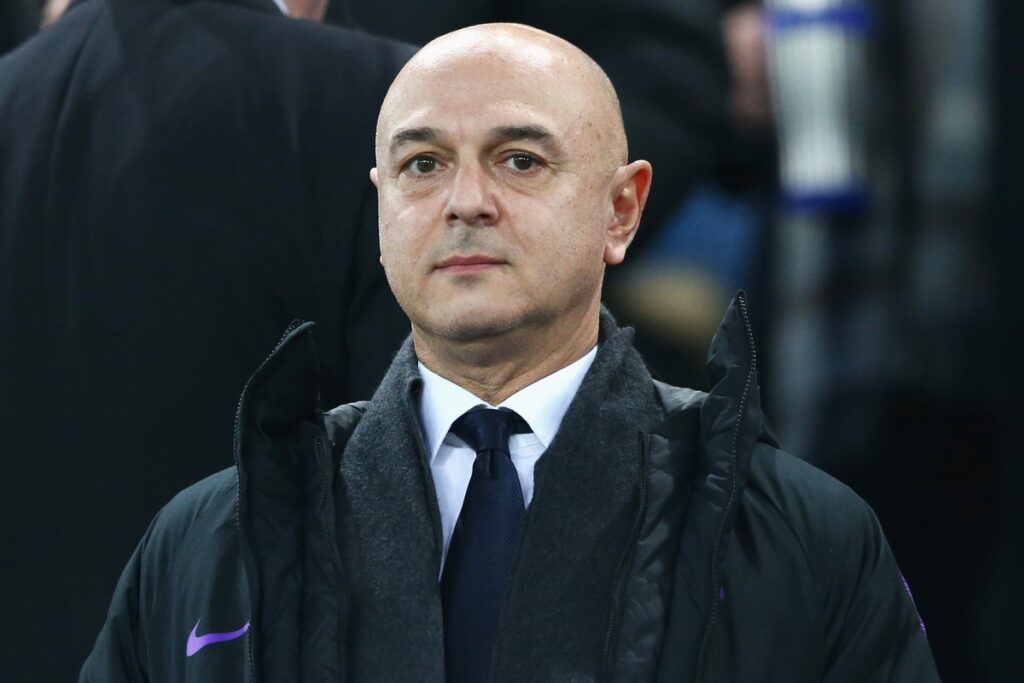In an email to Tottenham Hotspur staff, where new chief executive Vinai Venkatesham acknowledged that Daniel Levy’s departure would come as “a shock to all of you”, while insisting that “it is very much business as usual”. Such sentiments were undercut by the very fact that some people were stopped in their tracks, as well as the messages from elsewhere in the club.
Spurs, it has been insisted, will no longer be so much about business. They’re going to be about “sustained sporting success”.
This was the primary reason that the Tavistock Group, under the ownership of the Lewis family, took the decision out of Levy’s hands. They wanted change. There had also been an awareness of fan unrest. Vivienne Lewis, one of the younger generation heading up the Lewis Family Trust, is now seen as an influential figure.
“Business” in short, will not be the same again – and the impact may reach beyond Spurs.
The longest-serving chairman in the Premier League, and a central figure in its political and economic structures, is gone. That is more consequential than it sounds. Many of the most senior executives in football, some who would consider themselves friends of Levy, were stunned.
Multiple such sources spoke of how they’d heard of growing tension at the top level of Spurs, that had been bubbling away for years between Levy and previous owner Joe Lewis. A lingering tension came across loud and clear in a statement given by the family to Sky News.
“Generations of the Lewis family support this special football club and they want what the fans want – more wins more often. This is why you have seen recent changes, new leadership and a fresh approach.
“In Vinai (Venkatesham), Thomas (Frank) and Peter Charrington, they believe they are backing the right team to deliver on this. This is a new era.”

If so, the last acts of the old era were a series of insufficient bids for forwards, as the club desperately tried for another attacker in the last days of the transfer window. Some Premier League figures had long tired of doing business with Levy. “You did a deal once and you never wanted to do it again,” in the words of one source. His previously fearsome reputation in negotiations had long faded. People were just fatigued.
It had even been noted how Spurs were finally willing to spend big money, from new investment, but it was like they didn’t know how to; as if they didn’t know how to go and make a big blockbuster deal happen. This was most evident in a frustrated pursuit of Morgan Rogers. Some close to the situation insisted that one of the other “big six” would have put forward a huge figure to test Aston Villa’s resolve. Spurs wouldn’t do it without having a sense of a price.
It was viewed as typical of the club under Levy, and all the more ironic given his own fixation on being a “big club”. That often applied to refusing to sell players even when it made sense, and in the appointment of so many “name” managers when they weren’t right for the club. Sources began to believe that “ego” was getting in the way.
And yet such sentiments are directly countered by immense admiration elsewhere, especially for the way Levy bust Spurs into that “big six”. Some of the most senior figures in the Premier League enthuse about how he has done a “brilliant job”, and really like him. That was one huge reason that Spurs were brought into the Super League, precisely for his business acumen.
Get unrivalled insight into the week’s biggest football stories – sign up to Miguel Delaney: Inside Football.
It’s consequently fair to say he splits opinion, just as he does among fans, to go with that distinctive split in the debate about his legacy: the business versus the football; the macro of running a football club against the micro.
The debate around Levy has always been binary, which is all too fitting for an official who has always brought it down to the numbers. That applied to the prioritisation of the top four over silverware, the number he would always demand in any transfer deal, the wage ratio, the record revenue, and the trophies.
The latter two are what it really will come down to. The last accounts showed a revenue of £528.4m, already up £209.8m from Mauricio Pochettino’s launchpad season of 2015-16. And yet, amid a wage-to-turnover ratio of just 42 per cent, Levy’s chairmanship only produced two trophies.
On finally winning the second, that Europa League in May, Levy excitedly spoke about that victory being the launchpad for more. He certainly didn’t sound like someone who was about to leave, either in the aftermath of that or his revealing recent interview with Gary Neville.
“We want to win the Premier League. We want to win the Champions League. We want to win.”
Spurs may now do so without him. And, if they do, it might well be put down to this decision.
It should never be forgotten that Levy does actually leave Spurs in a better place. Quite literally, given that their facilities are among the best in Europe. The best players and managers in the world are genuinely wowed when they see the training ground and then the stadium. What has put them off has been the pay, and what has happened on the pitch, with the two obviously connected.
Giorgio Chiellini notoriously captured the essence of the modern club when describing a comeback defeat as “the history of the Tottenham”. There, but never quite enough. Spursy.
They were obviously in a better place, but it was no longer the best possible place. Spurs weren’t maximising what they could be.
Given that financial potential, given that London location, the stadium should be talked of as welcoming major trophies more than Beyonce concerts. It was like Levy had become too anchored to a certain way, that had too much power, that was no longer so efficient. Much like his approach to negotiations.
By the end, there wasn’t even a fan debate. The sacking of Ange Postecoglou even left a sour note to the Europa League victory, despite the logic of the decision. And yet all of that must still be put in a certain context.
When Levy was appointed in March 2001, the Premier League was still a relatively parochial competition, at least in terms of profile. Most of the owners were still local businessmen. It’s now a very different world, with two states owning clubs, and multiple capitalist funds.
Spurs have been central to all of that change. Levy has been a driving figure in Premier League meetings, especially about broadcast revenue debates.
The big question now is whether Spurs will cause further change to this world, whether there could even be a third state, given Qatar’s purported interest in buying the club. Industry figures have speculated that much of this activity looks like an institution being readied for a sale, not least in the departure of this one central figure. On the other side, there were at least as many murmurs about the ownership now wanting to bed in and maximise the asset.
The final sentence of Spurs’ statement read: “There are no changes to the ownership or shareholder structure of the club.”
No changes now. But in the future? Industry sources believe there could be a sale if anyone hits the £4bn valuation. The next business will be interesting. It just won’t be the same as before.
Read the full article here


